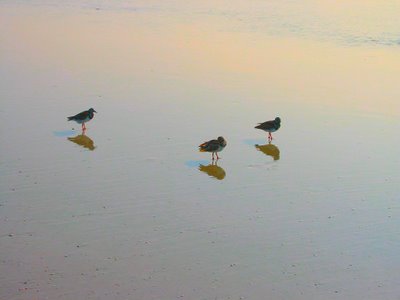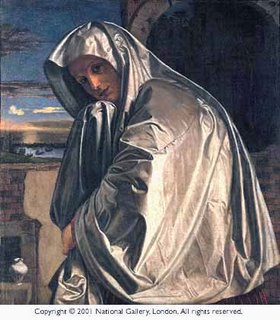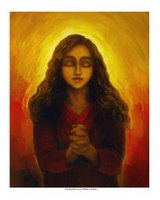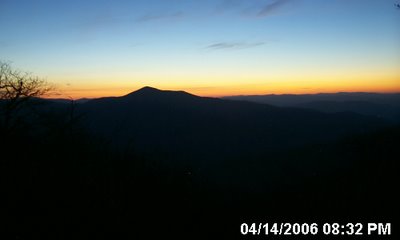11:20 am ~
I'm more or less familiar with the rituals of Passover, because I teach in a school where Pesach cleaning was in full evidence last week. Not the tiniest bread crumb is permitted to remain in residence in an observant Jewish home, pursuant to God's instructions in the Exodus 12:
"You shall observe the festival of unleavened bread, for on this very day I brought your companies out of the land of Egypt: you shall observe this day throughout your generations as a perpetual ordinance. In the first month, from the evening of the fourteenth day until the evening of the twenty-first day, you shall eat unleavened bread. For seven days no leaven shall be found in your houses; for whoever eats what is leavened shall be cut off from the congregation of Israel, whether an alien or a native of the land. You shall eat nothing leavened; in all your settlements you shall eat unleavened bread."
But even though I am familiar with the events and their celebration, I re-read the text this morning before heading out on my walk. It leapt from the page differently than it has in the past. When God says to Moshe, after describing what is about to happen on the first Passover night -- "This day shall be a day of remembrance for you. You shall celebrate it as a festival to the Lord; throughout your generations you shall observe it as a perpetual ordinance" -- well, yesterday I was talking on the phone to a colleague, friend, and mother of two young men whom I have taught as she laughed about the astounding amount of cooking she has done over the past few days in response to those 3000-year-old words. It is, like most of what I find in faith, a remarkable juxtaposition: the ancient words of God and the activities of a suburban American woman.
At the same time, I was reminded of one of the essays in the book Killing the Buddha. Of course, I can't find the book, so I can't credit the writer, but he's a Jewish man explaining why he no longer celebrates Pesach, the holiday on which the firstborn of the Egyptians were killed. By God. He notes that of the Jewish women he knows -- lovely, gracious, hospitable women -- not one of them would feel anything other than horror at the prospect of harm coming to a child -- any child -- and yet they spend this week preparing to celebrate an event at the center of which lies a grave harm to children.
Yes, there is that, too.
As I started on my walk, I imagined what it would have been like to be a Jewish woman on the night of the original "passing over." A woman in a pre-Mosaic law, pre-rabbinical Judaism; a member of an exhausted group of people enslaved by a megalomaniac pharoah. A people with a couple of old stories about a god who had promised our ancestors Avraham and Sarah that they would be the progenitors of a great nation, a god whose man Yosef had claimed that what his brothers had meant for ill, God had meant for good. What had happened to all those promises? I would have worked all day for someone else and come home to pull together a poorly prepared meal of not enough food for too large a family. And when my husband came home with the news that God was intervening again, and that we were to sacrifice a lamb and smear its blood on the doorway, I would have looked at him in frustration, knowing who was going to have to scrub that blood off the next day, and told him to do just whatever he wanted. And then we would have taken our children into the house and emerged the next morning to find that the world had changed and that our moment had come.
And then, being who I am, always wondering about all sides to a story, as we grabbed those belongings that we could carry and made our way into the wilderness, I would have wondered about my Egyptian counterpart. What was her experience?
If I had been an Egyptian woman, I would have had a very different day. I'm sure that I would not have been anyone special, and would have had plenty of work to do but, being a poor cook, I could have left the dinner preparation to someone else, possibly even a slave. I would not have given much thought to her status; it was a hard world, in which slavery was commonplace. And after she left, and my family had eaten well and relaxed and talked over our day, we would have gone to bed without any premonition at all that the night would bring with it total devastation. We did not have the words spoken by God to Moshe:
"About midnight I will go out through Egypt. Every firstborn in the land of Egypt shall die, from the firstborn of Pharaoh who sits on his throne to the firstborn of the female slave who is behind the handmill, and all the firstborn of the livestock. Then there will be a loud cry throughout the whole land of Egypt, such as has never been or will ever be again."
I have three children, and I treasure my firstborn son, as I do all of them, beyond words. He is only two minutes older than his brother, but as twins and their mothers remind us, he is still the oldest. I cannot fathom what it would be like to go to check on my children in the night and find him dead, gone from us forever. And then to tear out into the street, hysterically looking for help, only to find that all of my neighbors had been visited by the same tragedy, and then to learn, as the word passed through the neigborhoods, what had actually happened -- how would I have contended with such a revelation?
Must it always be that one is saved and preserved at the expense of another?
As a Jewish mother, I would have seen God as powerful and liberating. As an Egyptian woman, I would have seen the same god as powerful and brutally vengeful.
In the ancient world, the violence of a god who had tried repeatedly without effect to free a beloved people would have made sense. In a post-Holocaust world, the story of liberation is paramount.
Still, it's a complicated story, and a complex celebration. It must have been for Jesus as well, who would have participated in a Passover meal every year of his life.













































